Contents
Bee bark is a relatively thin layer of cut tops of combs used by beekeepers to produce wax. The medicinal properties of zabrus, how to take and store it, have long been known, since it is a constant companion of bee honey, and its percentage of yield during honey collection is quite high. It can even be said that in terms of a set of useful properties, zabrus is somewhat ahead of honey, since in addition to honey, it also contains wax.
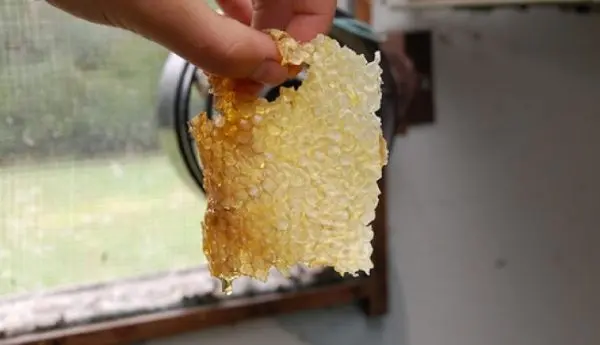
What is zabrus in beekeeping
Bee cast or “honey seal” is a by-product of beekeeping, which is the leftover from cutting off the top of the cap of clogged bee combs. The origin of its name is explained by the fact that the part of the honeycomb that is “behind the bar” of the beehive frame is cut off with a special knife.
The bees seal the honey in the combs as it is ready with the help of wax caps. That is, bee zabrus consists of wax. If the honeycomb is sealed, then the honey inside is ready for consumption. The presence of a seal on the entire area of the beehive frame indicates that this frame can be used for honey distillation.
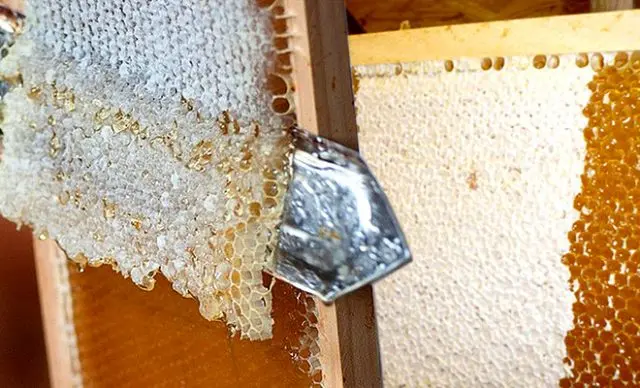
Immediately before honey is pumped out, the signet is cut off from the honeycomb using a special tool – a bee knife. Honeycombs are sent for distillation, and the signet is placed with the lid up for free flow of honey from it. Sometimes the signet is given to the bees so that they choose honey from it.
Dry signet is used for the production of wax or for medical purposes. It is melted in special wax furnaces. It is believed that the highest quality wax is obtained from zabrus. This may be true, since the chemical compositions of honeycomb wax and zabrus wax are different.
Print color is very different. It is influenced by the following parameters:
- honey collection time;
- weather;
- kind of bees.
During the absence of natural bee bribes, for example, in autumn, when the bees are artificially fed with sugar, the signet becomes brown. In the vast majority of other cases, the color of the signet is white, which is due to the presence of an air “plug” between the honey in the combs and their wax cover.
This method of sealing honeycombs is called “wet sealing”.
The taste of honey seal is sweetish, with a pronounced honey tint. When chewed, it breaks up into many small lumps.
The composition of honey zabrus
At present, almost everything is known about the composition of the zabrus. The basis of bee zabrus is wax, which contains a large amount of free fatty acids.
The composition of the honey seal includes:
- vitamin E or tocopherol;
- vitamins of group B;
- vitamin C;
- carotene;
- retinol.
In addition, bee zabrus contains many essential oils, saturated hydrocarbons, aromatic and pigmenting substances. It contains both antioxidants and lipids. Also, bee zabrus contains a small amount of protein, bee glue and other secrets of bee glands.
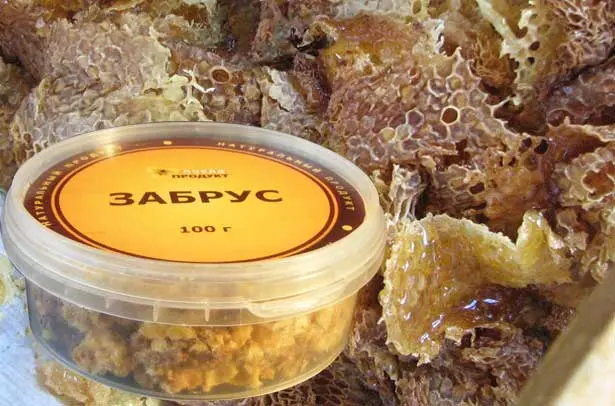
The mineral composition of bee zabrus is also very diverse. It includes:
- potassium;
- calcium;
- phosphorus;
- manganese;
- iron.
In general, it is difficult to find a product that has such a diverse composition of the components that go into it.
What is useful bee zabrus
Despite the fact that the benefits of zabrus for the body (as in general, any means and methods of apitherapy) have not yet been confirmed from the standpoint of evidence-based medicine, it is very widely used in folk practices.
Moreover, the use of almost any beekeeping product (from honey to death), at least, does not have negative consequences. The only exceptions are cases of individual intolerance and allergies.
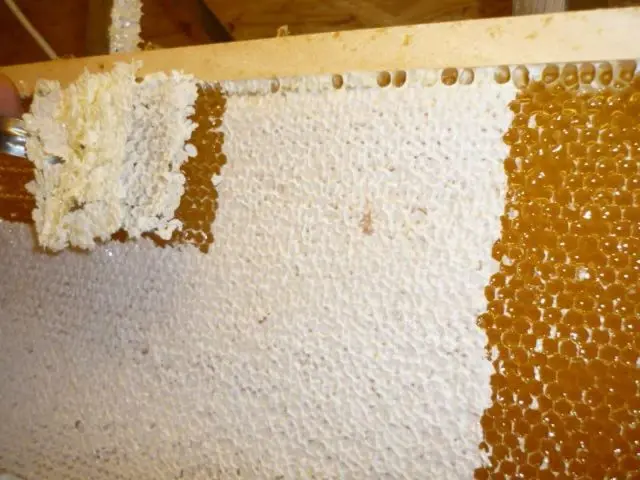
According to folk medicine, the beneficial properties of zabrus are manifested in the treatment of the following diseases:
- With acute respiratory infections or acute respiratory viral infections, bee zabrus helps to strengthen immunity, weakens inflammation in the sinuses and throat, and improves sputum discharge.
- In diseases of the respiratory system, it facilitates the course of sinusitis, tonsillitis, rhinitis. It is used to eliminate the symptoms of allergic manifestations. Cures hay fever.
- In diseases of the gastrointestinal tract, it activates the work of the glands of external and internal secretion, improves intestinal motility, accelerates metabolic processes, and normalizes appetite.
- In diseases of the cardiovascular system, it helps to purify the blood and improve its quality, lowers the concentration of cholesterol, and normalizes the functioning of the heart muscle.
- dental problems. It helps to reduce inflammation of the gums and mucous membranes, cleans tooth enamel, stimulates the secretion of saliva, helps with stomatitis and gingivitis. Its use is recommended as a side therapy for periodontal disease. Also, bee zabrus and propolis are recommended as a means of caries prevention. In general, it is this application, the solution of dental problems, that is considered the most important way to use the bee cast.
- Diseases of the musculoskeletal system. It is believed that this remedy helps well with arthritis and arthrosis, helps in the treatment of osteochondrosis of the spine. It is prescribed as an additional therapy for osteomyelitis and joint pathology.
Zabrus treatment
Useful properties of bee zabrus are mainly used in folk medicine. There are various ways to use honey seal in the treatment and prevention of diseases of various body systems.
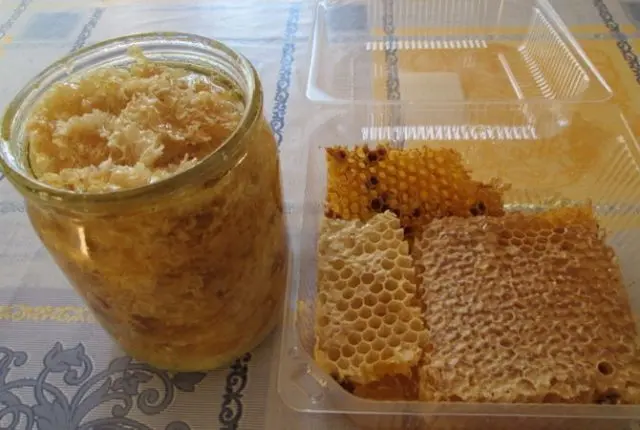
Zabrus for teeth from caries
The method of using the drug in the treatment and prevention of the dental cavity as a whole is the simplest and most natural – chewing it. The standard dosage is 1 tablespoon for adults or 1 teaspoon for children.
Chewing lasts for 10-20 minutes, while the lump of the drug must be moved throughout the entire volume of the oral cavity, as is done with chewing gum.
In some cases, it is allowed to use zabrus instead of toothpaste. In this case, teeth are brushed with a soft or medium-hard toothbrush for 10-15 minutes.
From sinusitis
Treatment of sinusitis with the help of zabrus is carried out as follows: it is necessary to chew 6 teaspoon of the drug 8-1 times a day for 15 minutes.
In the case of an advanced form of sinusitis, a single dose of the drug should be increased. The required amount in this case is 1 tablespoon.
With pancreatitis
In pancreatitis, honey seal is used as an auxiliary preparation that creates a layer that envelops the mucous membrane of the stomach and duodenum. It is used in conjunction with propolis.
Consume 2 times a day before meals. It is necessary half an hour before meals to thoroughly chew and swallow a mixture consisting of 1 tsp. bee zabrus and 1 tsp. propolis. The course of treatment is 1 month.
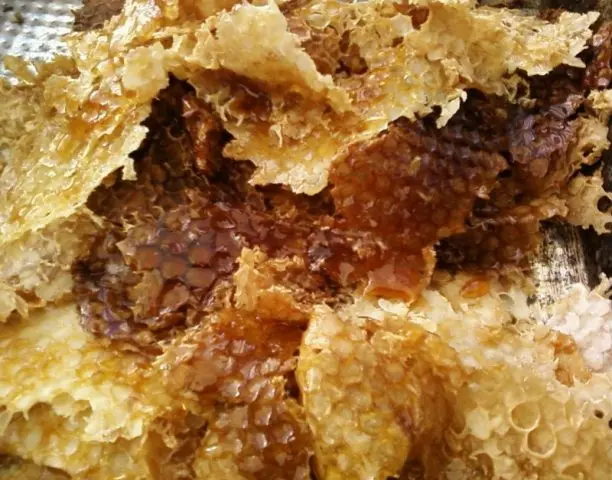
From allergies
The use as a remedy for allergies is based on the “training” of the body’s immune system to resist the factors that cause it. Signet in its composition contains a small amount of many allergens: from bee honey to pollen and essential oils. Getting regularly into the body in negligibly small doses, they “train” it to cope with their toxic effects.
Therefore, the course of allergy treatment in this case lasts quite a long time – from six months to 8 months. Treatment consists in daily use of 6-8 tsp. drug during the day. It must be chewed as standard for 15 minutes.
In case of exacerbation of allergies, it is recommended to take a large dose of the drug – it should be chewed up to 1-1,5 tablespoons. It will not allow allergies to develop rapidly; in addition, the use of a signet will relieve swelling of the mucosa.
From a sore throat
With angina, the antibacterial properties of honey seal are used. It must be consumed every half an hour, dissolving small balls weighing no more than 1 g. The resorption time of such a ball will be about 5 minutes. It is recommended to use this treatment no more than 6 hours a day.
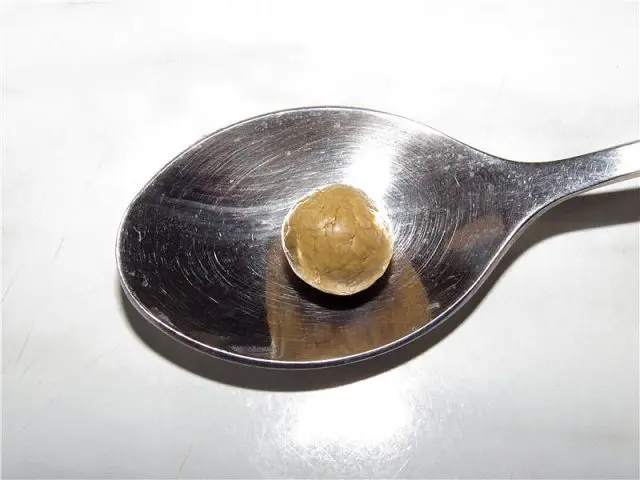
Due to the short breaks between chewing, a permanent protective layer is created on the mucous membrane of the upper respiratory tract, preventing the spread of infection.
For acne
The drug is used not only for the treatment of small acne, but also for serious problems in the form of purulent acne or even boils. To combat these phenomena, an antibacterial compress should be prepared, in which the signet will be one of the active components.
The second component will be bee nectar. For this purpose, the use of buckwheat nectar will be optimal. The third component will be medical alcohol.
The components are mixed in equal proportions, the resulting mixture is applied to problem areas of the skin for up to half an hour. It is allowed to use such a compress no more than 3 times a day.
For diseases of the joints
For diseases of the joints, an ointment made using zabrus is used. This ointment is applied to problem areas and left for 30 minutes to 2 hours 1-2 times a day.
The composition of the ointment:
- base (vegetable oil, olive, ghee, etc.) – 100 g;
- zabrus – 15 g;
- dead bees – 5-10g.
The components are mixed in a water bath with a temperature not exceeding + 50 °C. After that, the ointment cools down, it is placed in the refrigerator, where it thickens.
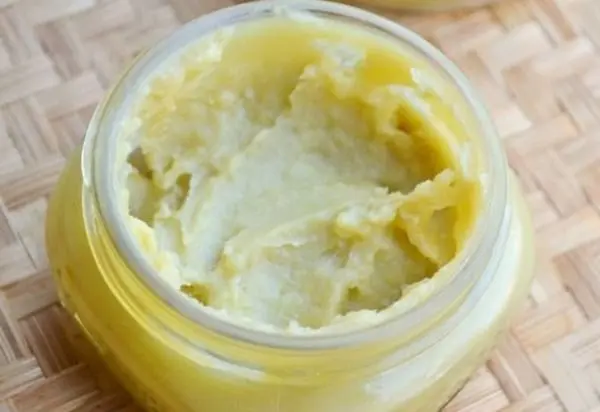
Before use, the required amount of ointment should be heated.
For immunity
To raise immunity, a course is used, lasting from 1 to 2 months with daily use of a small amount of the drug (no more than 1 teaspoon per day). However, it must be chewed very slowly.
If during the prevention of various diseases the chewing time was about 15 minutes, then in the case of using immuno-supportive therapy, this should be done for about half an hour, without showing excessive activity. That is, you should not work too hard with your jaws when chewing zabrus.
With diseases of the gastrointestinal tract
The procedure for the prevention of gastrointestinal diseases is similar to the use of zabrus in pancreatitis, with the only difference being that the ratio of propolis and zabrus will not be 1 to 1, but 1 to 2. Procedures can be performed from 1 to 3 times a day.
From cough
The algorithm is similar to the treatment of angina – the constant maintenance of cover on the mucous membranes of the upper respiratory tract. In this case, you can use not small balls, but full doses of 1 tsp. The pause between applications depends on the intensity of the cough. The recommended time is from half an hour to an hour.
During the day, the duration of such a procedure for more than 6 hours is not recommended.
How to take zabrus
The use of the healing properties of zabrus can be carried out in various ways. The classic option for using bee zabrus is to use it in its pure form, without any additives.
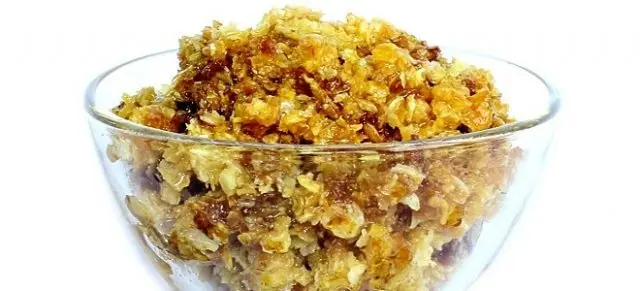
The product should not be thermally processed as its melting point is very low and any overheating is harmful to it. Grinding the product is also not recommended, since this significantly increases the rate of evaporation of essential oils and the drying of many components.
Attention! By “heat treatment” should not be understood only the boiling process. Already when heated to + 55 ° C, most bee products, which include both zabrus and honey, lose up to 80% of their useful properties!
It is advisable to cut the bee zabrus into sufficiently large pieces and chew it for several minutes, as one chews a chewing cutter. At the same time, saliva has time to dissolve almost all active and beneficial substances, and they are relatively quickly absorbed into the body through the surface of the oral mucosa.
Is it possible to swallow zabrus
There are no negative consequences of swallowing zabrus. In addition, it is even recommended to use it inside for the following diseases:
- constipation;
- bloating;
- cuts in lives;
- inflammation of the bile ducts;
- problems with the functioning of the liver and gallbladder.
Contraindications for casting
The benefits and harms of bee zabrus have already been studied quite well. In its pure form, the product, devoid of honeycomb, does not pose a threat to allergy sufferers, moreover, it is an excellent remedy for eliminating allergy symptoms.
The only contraindication to use is individual intolerance to wax. This deviation occurs, although not often, but its probability should not be discounted. In case of fear of manifestations of such intolerance, any course of treatment with zabrus should be started with small doses.
Therefore, if there is an allergy or individual intolerance to cosmetic wax, the likelihood of individual intolerance to beeswax is high. In this case, the casting should be used with extreme caution.
Children should be given bee zabrus from the age of three. This is the usual age for introducing problem foods and similar types of drugs into the diet. There are no special recommendations for monitoring the child’s condition.
Pregnant women are allowed to use zabrus only after consultation with the doctor conducting the observation.
Terms and conditions of storage
Bee zabrus is usually sold in glass jars with an airtight lid. This greatly simplifies the process of organizing its storage. Honey is an excellent preservative that preserves the properties of bee zabrus. The less honey in the zabrus, the higher the requirements for its storage conditions are.
With a ratio of zabrus / honey in a sealed container of 1 to 1, such a container can be stored even at room temperature (+ 20-22 ° C) for 3 years. If there is less honey, then it is necessary to use a refrigerator for storage (temperature + 8-10 ° C).
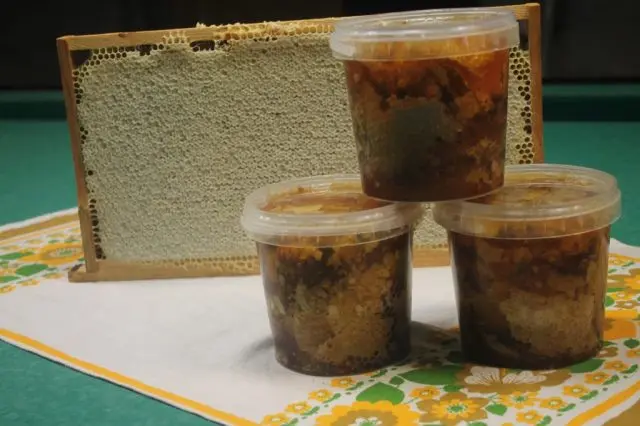
During storage, the jar with zabrus should not be exposed to direct sunlight or kept in a room with a high level of humidity.
The safety of all active components in the cast, subject to storage conditions, is ensured for about 2 years. During the third year of storage, about 15-20% of the components lose their properties. In the fourth year, zabrus can still be eaten, but it will no longer be of any medical value.
Conclusion
Many people are still wondering what are the medicinal properties of zabrus, how to take zabrus and what will be the consequences. It is safe to say that there is no negative effect from its use (in the form of rare cases of individual intolerance to wax). Zabrus bee has a positive effect on many systems of the body and helps to keep the oral cavity in excellent condition. In addition, given the hypoallergenicity of wax, zabrus is one of the best antiallergic drugs.










onde comprar Mel de Zabrus?